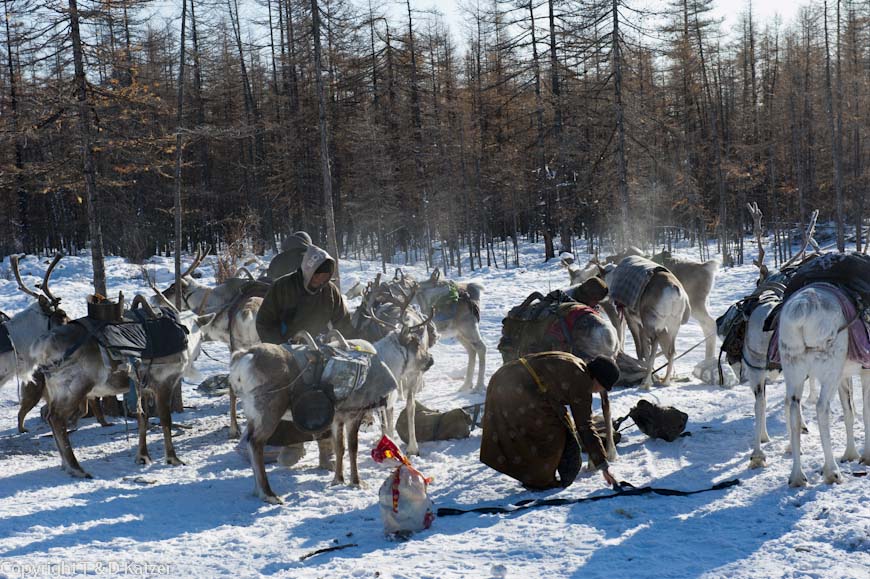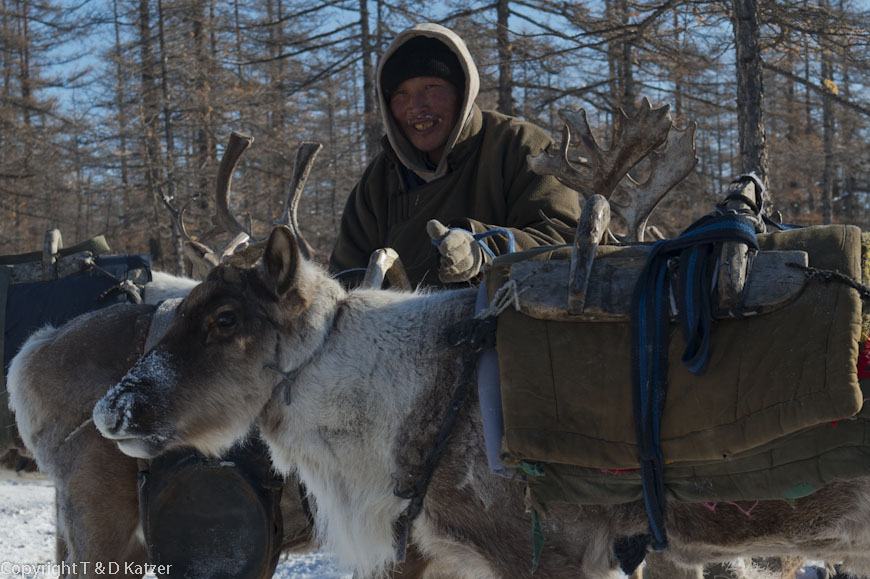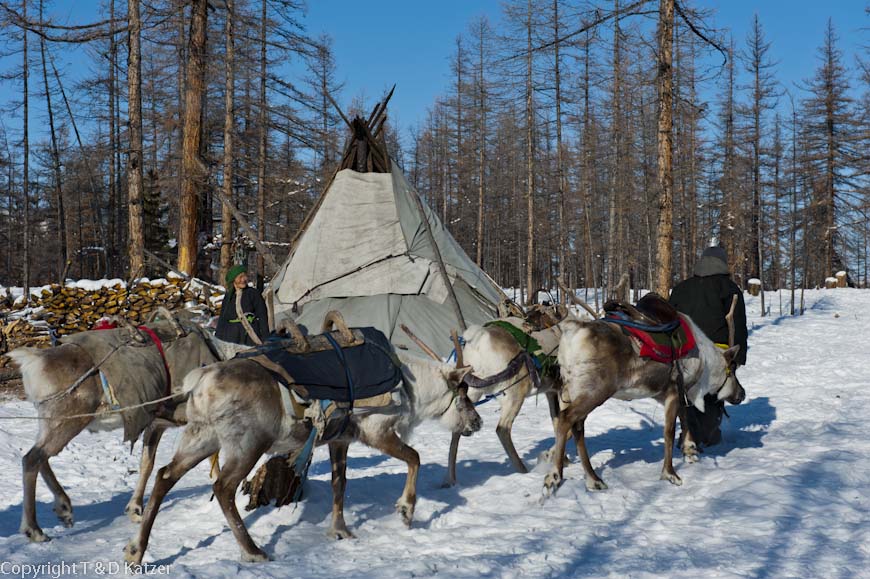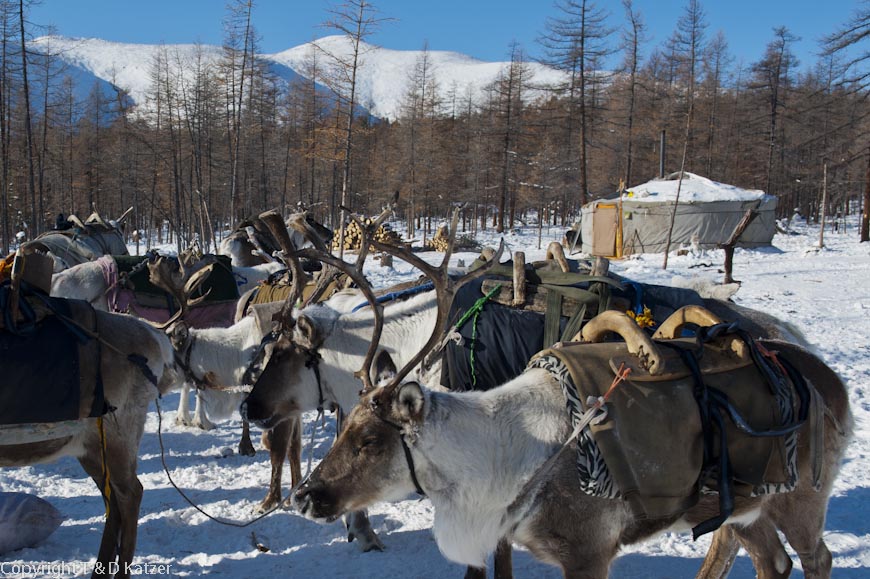
After 18 days of arctic cold
N 51°33'336'' E 099°15'341''
Day: 194-195
Sunrise:
08:55
Sunset:
18:17
Total kilometers:
1281
Soil condition:
Ice, snow
Temperature – Day (maximum):
minus 15°C
Temperature – day (minimum):
minus 28°C
Temperature – Night:
minus 39°C
Latitude:
51°33’336”
Longitude:
099°15’341”
Maximum height:
1981 m above sea level









As we do almost every day, we trudge through the nearby woods looking for fallen trees. Although the Tuwa have been using this winter camp for three years and many trees have already been felled, it is no problem to find enough firewood. “There’s an old trunk here. We can saw it up,” I say. “And you’re sure it wasn’t felled by one of the Tuwa men?” asks Tanja. “That’s for sure. Look at the roots. It clearly fell by itself. Probably blown down by a storm,” I reply. With the chainsaw, I start to cut it into manageable pieces when Tanja suddenly spots two dogs roaming through the forest. “Do you recognize her?” I ask. “No, they’re definitely not dogs from the camp.” “But who would the dogs belong to if not the men?” “There were also Tuwa from Tsagaan Nuur. Do you remember?” “Sure.” “They may have brought their own dogs,” Tanja ponders. “Do you think the dogs are the vanguard of the returning reindeer nomads?” I ask. “Could be”. “Well then, let’s go and meet them!”
As we expected them to return home every day, we took our cameras with us to work in the forest so that we could capture the arrival of the men in pictures and film. We leave the chainsaw and axe by the tree trunk and sprint down the hill where the taiga dwellers have set up camp as best the snow and the rocks hidden underneath allow. We actually catch a glimpse of movement between the partly icy trees. “It’s you!” Tanja calls softly. We pull our cameras out of our bags and hurry on. “Saijn bajna uu! Saijn bajna uu!” (“Good day! Good day”) we shout joyfully to the two men and give them the thumbs up. Galaa from tipi two smiles at us. His face is literally tanned by the winter sun. His six reindeer trundle past us at a fast pace. While Galaa rides on one of the animals, the other leads his loaded reindeer behind him. He separates from his companion and takes a left turn. He is obviously taking a shortcut.
We wonder where the other 11 men are and walk down the hill to the clearing. “There’s someone there,” I say, pointing to a red spot shimmering through the branches. “Indeed,” says Tanja. As we get closer, we recognize Ultsan’s uncle Bayandalai lying stretched out in the snow. “Oh God! Nothing will have happened to him, will it?” I shout, and we start running. When we reach him, he straightens up and laughs at us. “Are you all right?” asks Tanja anxiously. “Sain”, (“Good”) he says, stretching the thumb of his right hand upwards. “I’m just resting a bit. My knees hurt,” he explains. “Where are the others? I hope everything’s all right?” we ask. “Tijmee tijmee. (Yes, yes) Some will arrive in a few hours. The rest will reach the camp tomorrow or the day after tomorrow,” he explains. We offer him a cigarette, which he gratefully accepts and lights up immediately. He inhales the smoke with relish. Then he rises and climbs up the hill with us to the camp.
In the evening, more riders reach our camp with their heavily laden animals. “What did they put on the animals?” asks Tanja. “No idea. Looks like stones. Maybe they found jade?” I guess. “Is that jade?” I ask Shagai who, his face contorted with pain, unties the icy ropes that bind the coarse chunks to the deer’s pack saddles. “Tijmee,” he replies, panting heavily. “Are you all right?” I ask. “My back. I hurt my back,” he replies, hunched over and running to the nearest reindeer to free it from its 80 kilogram load of jade. “Rumble!” the rock hits the hard-packed snow and misses the animal’s protruding hooves by just a few centimeters.
After all the pack animals have been unloaded and the stones and equipment are scattered wildly on the snow, the frozen and hungry nomads go into Saintsetseg’s tepee. They enjoy the warmth of the fire and eat hot bread and Boortsog. Bayandalai digs his teeth into a loaf of bread with sugar and drinks hot, salted milk tea. They talk about their experiences over the last 2 ½ weeks. “Six men are still at the fence. They need another two days to finish building the barrier and will arrive the day after tomorrow. We haven’t had anything to eat for days. Because we’ve been on the road longer than we thought, our food supplies have been used up. The hungriest of us have already set off. “How is my Ultsan?” asks Tsaya, as he is one of the six companions left in the wilderness. “He’s fine,” replies Shagai.
It is already dawn when one of the Tuwa leaves the camp with his reindeer. “He brings food to his companions and fetches more jade stones,” explains Tsaya. “The men have found a lot of jade,” I say. “That’s not our jade. The reindeer were rented by Mongolians who were mining jade out there. The way to our camp is shorter than if they were to ride from there to Tsagaan Nuur. A four-wheel drive bus will arrive this evening to transport the stones to the village.
It is only mid-morning the next day when we hear the crunching clatter of many reindeer caused by the frosty snow. As announced, six Tuwa ride into camp with their loaded pack animals. All the inhabitants of the base come out of their tipis and log cabins to help them unload. Tsaya is overjoyed to be able to hold her Ultsan in her arms after 18 days. Together they unload their tired animals. Each of the stags is loaded with around 80 kilograms of the valuable jade stones. The tree-lined square in front of the two log cabins and our yurt is a hive of activity. Women laugh and men shout. Some people arrange their jade stones in a pile. Ultsan leaves his on his log cabin. The breath of humans and animals steams in the icy air, billowing as a white, constantly shifting cloud above the action until it is literally consumed by the cold. Despite the wonderful sunshine, the thermometer is at minus 28 °C. The sight of the many, mostly white reindeer and the people hard at work is hard to describe and takes us back to a forgotten time.
Tanja invites the men to tea and cookies in our yurt. “Tschin setgeleesee bajrlalaa”, they thank us warmly. A little later, Ganaa and Sumber are sitting in our home and enjoying the hot drink. “Must have been pretty cold,” I ask. “Oh yes. It was very cold. Especially at night,” replies Ganaa. “The thermometer has dropped to minus 43 °C. Thank God you didn’t freeze to death,” I continue my conversation. “Oh yes, you did. I froze my fingers on both hands,” Ganaa replies, holding out his bad-looking hands to us. “Oh dear. That looks terrible,” says Tanja sympathetically. “It’s not as tragic as it looks. You’ll be fine,” he laughs.
It’s already 8 p.m. when Tsaya and her Ultsan turn up at our yurt. “Hello Ultsan. How are you?” Tanja and I ask at the same time. “Great, now that I’ve satisfied my hunger for bears,” he replies with a laugh, sitting down on the little folding stool. Was it a tough trip?” I ask. “Tijmee”, (“Yes”) he says, groaning slightly. “It was mainly the hunger that got to us a bit. I found a bag of cookies in a branch fork”. “Biscuits?” I interrupt him in surprise. “Tijmee. Someone must have put them there. I ate them straight away. I didn’t feel well after that. They were probably quite old.” “Probably the reason why the owner got rid of the cookies. Just as well you didn’t get food poisoning out there,” says Tanja, to which he nods wearily.
“Phew, it’s warm here. I’m not used to it anymore.” “Well, I’m sure you’ll sleep well tonight. Tsaja will certainly keep you warm,” I say with a grin. “Ha, ha, ha. I hope,” he replies, to which Tsaya looks at him with shining eyes. “I’m so glad to have him back with me,” she says, stroking his short hair. “We are also relieved to see Ultsan safe and in one piece,” I reply. And ask how the fence construction is progressing. “It was more work than we all thought. To close off the valley, we had to build a barrier of about two kilometers from one rock massif to the other.” “Two kilometers? That’s huge,” I snort. “We needed a lot of branches and shrubbery to build the structure, which is up to two meters high. But now none of our reindeer can get out of there.” “Shagai told me that the fence also keeps wolves out. Is that true?” “If the wolf doesn’t get a whiff of our animals, yes. But sometimes the hunter gets over the rocks into the valley. We can only hope and rely on the protection of the gods. This year our herd has even increased.” “What? How is that possible? I thought the newborns only came in April?” I wonder. “There are also wild reindeer out there. Two of them have joined our herd,” he explains with a laugh.
You brought lots of jade stones with you on your reindeer. Is it difficult to find these valuable stones?” I want to know. “Not if you know where the jade deposits are. But I’ll tell you about them tomorrow. I’m dog-tired today,” he apologizes. “Sure, get some rest. Let your wife keep you warm and have nice dreams,” we say goodbye.
We look forward to your comments!

